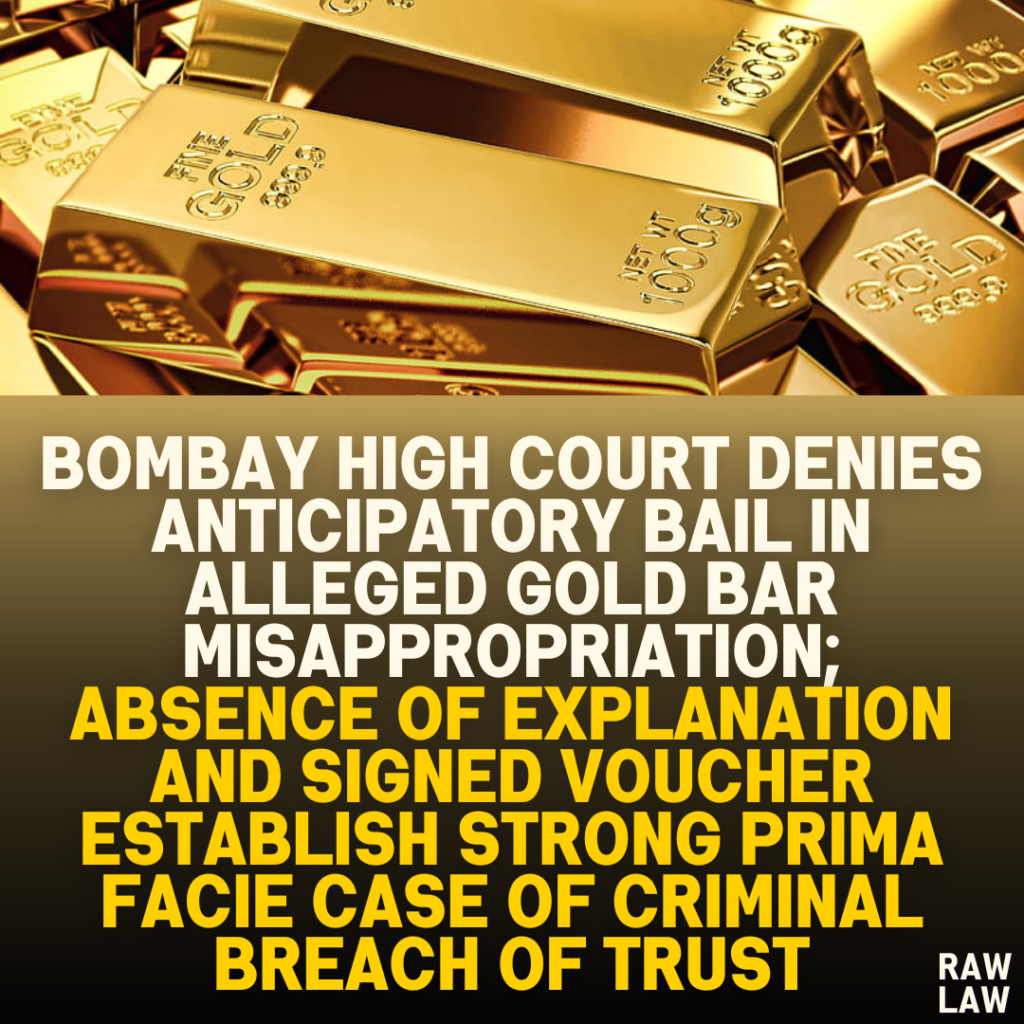Court’s Decision:
The Bombay High Court dismissed the anticipatory bail application of the applicant who was accused of misappropriating a gold bar weighing 1500 grams. The court held that there was a strong prima facie case against the applicant based on the informant’s statement and supporting documents, including a voucher showing the transfer of the gold bar, which bore the applicant’s signature.
Facts:
The applicant was apprehending arrest in connection with a First Information Report (FIR) filed under Sections 420 (cheating) and 409 (criminal breach of trust) of the Indian Penal Code. The FIR was registered by an informant who alleged that he had known the applicant for around 10 years. The applicant, who was in the business of making gold jewelry, allegedly persuaded the informant to hand over a gold bar of 1500 grams on 3rd November 2023 under the promise of making jewelry. However, the applicant neither delivered the promised jewelry nor returned the gold bar.
Issues:
The key issue was whether the applicant should be granted anticipatory bail, particularly given the allegation that the gold bar was misappropriated and whether the documents provided established a prima facie case against the applicant.
Petitioner’s Arguments:
The counsel for the applicant argued that the allegations were false and baseless. He contended that no evidence supported the claim that the gold bar had been handed over. Additionally, the informant was alleged to have a criminal background, with the Department of Revenue Intelligence (DRI) initiating proceedings against him. The applicant further submitted that he was willing to cooperate with the investigation.
Respondent’s Arguments:
The prosecution argued that the informant’s statement and documentary evidence, including a voucher signed by the applicant, clearly indicated that the gold bar had been handed over. It was further submitted that the material collected during the investigation substantiated the charges against the applicant and justified the denial of bail.
Analysis of the Law:
The court examined whether the material submitted by the prosecution made out the ingredients of the offences under Sections 420 and 409 of the IPC. The court noted that the informant’s statement, coupled with the documentary evidence, provided sufficient grounds to establish a prima facie case against the applicant for cheating and criminal breach of trust.
Precedent Analysis:
While the judgment did not explicitly refer to previous cases, the legal standards for anticipatory bail, especially in cases involving criminal breach of trust and cheating, were applied. The court looked for the presence of credible evidence and the strength of the prosecution’s case in determining the outcome of the bail application.
Court’s Reasoning:
The court found that the material provided, including the signed voucher, established a strong prima facie case. The applicant failed to provide any explanation or evidence to contradict the allegations. The court emphasized that the absence of any explanation from the applicant weighed heavily against him. Furthermore, the court noted that the Sessions Court had already considered the material before denying the application for anticipatory bail at an earlier stage.
Conclusion:
The court concluded that the applicant had not made out a case for the grant of anticipatory bail. The documentary evidence, including the voucher signed by the applicant, was sufficient to establish a prima facie case of criminal breach of trust. As a result, the court dismissed the anticipatory bail application.
Implications:
This decision underscores the court’s approach in cases involving allegations of criminal breach of trust, particularly where documentary evidence supports the prosecution’s case. The judgment highlights the importance of credible documentary evidence in bail applications and indicates that anticipatory bail is unlikely to be granted where a strong prima facie case is established against the accused.




Pingback: Karnataka High Court Upholds Conviction for Dishonored Cheques Under Section 138 of Negotiable Instruments Act, Removes Fine for State Expenses Citing Private Nature of Dispute - Raw Law